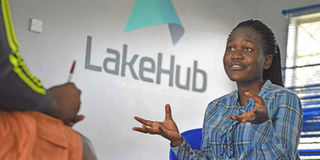Female genital mutilation: Using I-Cut to fight the cut

Stacy Adhiambo during an interview at LakeHub offices in Kisumu on January 8, 2019. Adhiambo is among five girls from Kisumu who developed mobile application I-Cut. PHOTO | ONDARI OGEGA | NATION MEDIA GROUP
What you need to know:
The app makes it easier for young women to seek immediate help, find rescue centres or report such incidents to the authorities.
The quintet now call themselves The Restorers, and they adopted this name because they “want to restore hope to hopeless girls.”
FGM is internationally recognised as a human rights violation which has affected more than 200 million girls and women.
Technology is rapidly revolutionising operations across all spheres of life, and offering quick solutions to even the most complex societal problems.
Many local innovators have attracted global recognition and prestigious awards for their good work, and in Kisumu, a group of girls from Kisumu Girls High School have shocked many by creating an app that can help in the fight against female genital mutilation (FGM).
In October, 2019, the quintet was among five nominees whose names were froned for a prestigious global award by the European Parliament.
The girls, aged between 18 and 19, are Stacy Adhiambo, Purity Achieng, Ivy Achieng, Cynthia Otieno and Macrine Akinyi. Macrine and Ivy are in their final year in secondary school while the others are now in university.
It all started with a deep desire to do something to help the defenseless girls who are sometimes forcefully subjected to the cultural vice.
Although outlawed, FGM continues to thrive in Kenya, and is carried out in some communities despite the fact that the harmful tradition has claimed hundreds of lives of young women over the years.
The five Kenyan students developed I-cut, a mobile app that is meant to help victims and potential victims of FGM to deal with the vice.
The mobile app connects girls who are at highest risk of circumcision to rescue centers from where they can get help. It also offers legal and medical help to those who have been subjected to FGM.
It has various segments, a phone number to call or text, a platform where they can inform the public on the effects of FGM and get feedback, and a rescue button too. It also has a ‘donate feature’ where the public can contribute to help the rescue centers under the programme.
The app makes it easier for young women to seek immediate help, find rescue centres or report such incidents to the authorities.
The quintet now call themselves The Restorers, and they adopted this name because they “want to restore hope to hopeless girls.”
According to 18-year old Stacy Adhiambo, now a first year student at Jomo Kenyatta University of Agriculture and Technology (JKUAT) studying computer science, they were roused to action by news that many young girls in rural Kenya were suffering terribly from the side effects that are associated with the procedure, and they decided to do something to change the situation.
“We developed the app after we realised that efforts by activists to end FGM were not entirely successful. We wanted to offer our help to the girls who were in most danger and eventually reduce such incidences,” said Adhiambo.
In coming up with the app, The Restorers partnered with several non-governmental organisations.
FGM is internationally recognised as a human rights violation which has affected more than 200 million girls and women. Many others are still at risk.
The innovation by the five girls is expected to become a useful tool in the war against the vice which is still viewed as a rite of passage in some communities.
Stacy, Purity, Ivy, Cynthia and Macrine finished as finalists in the Sakharov Prize for Freedom of Thought 2017, and were nominated alongside four other contenders – two from Brazil and one each from China and Russia.
The nomination was done by at least 40 members of the European Parliament or by a political group, and the justifications and biographies received by the Human Rights Actions Unit were also taken into account.
Although the Sakharov prize was ultimately taken home by Ilham Tohti, a fierce critic of China’s treatment of the Uighur people, the efforts by the Kisumu Girls group remain celebrated.
In January last year, The Restorers also won the prestigious African of the Year award for 2018.
This was after a selection committee of the Daily Trust African of the Year, headed by former President of Botswana Festus Mogae, settled on them as winners of the highly coveted continental award.
The winners of the African of the Year award usually get Sh2.5 million ($25,000) in prize money in addition to a specially made plaque, and the five were honoured at a colourful ceremony in Abuja, Nigeria on January 16.
They were also Africa’s only representatives at Google’s 2017 Technovation challenge which took place in Silicon Valley, California, USA.
Statistics by United Nations Population Fund (UNFPA) estimate that one in four Kenyan women and girls have undergone FGM, which involves the partial or total removal of the external genitalia.
And according to UNICEF, 200 million girls and women around the world have been subjected to FGM, which it described as “a range of procedures that can cause extreme physical and psychological pain, prolonged bleeding, HIV, infertility and death.”
European Conservatives and Reformists Groups who nominated the five girls believe the app will allow many others to chart their own destinies.
They say their hope goes beyond the app.
“Recognising this act of hope and self-determination will also push the emancipation of girls on the global agenda and encourage such initiatives,” they said.





